Primary Source Analysis of Thomas Hobbes' Leviathan
VerifiedAdded on 2023/04/23
|6
|1451
|416
AI Summary
This essay is a primary source analysis of an excerpt by Thomas Hobbes’s book “Leviathan” that was published in the year 1651, which was one of the most powerful books introduced in the seventeenth century and the foundational text of the social contract theory. The essay argues that the idea of commonwealth and social contract theory is necessary and a healthy process to ensure peace and harmony within the society.
Contribute Materials
Your contribution can guide someone’s learning journey. Share your
documents today.
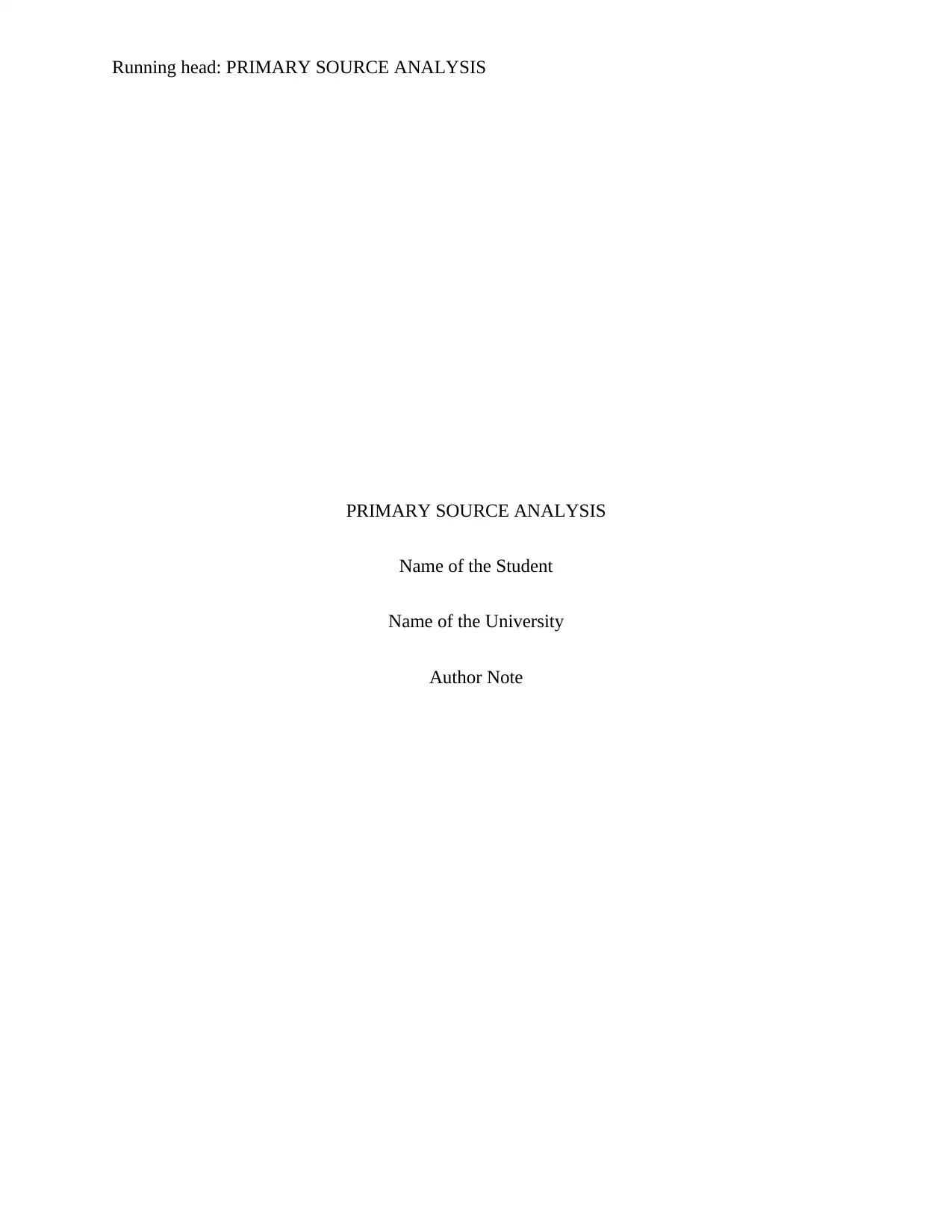
Running head: PRIMARY SOURCE ANALYSIS
PRIMARY SOURCE ANALYSIS
Name of the Student
Name of the University
Author Note
PRIMARY SOURCE ANALYSIS
Name of the Student
Name of the University
Author Note
Secure Best Marks with AI Grader
Need help grading? Try our AI Grader for instant feedback on your assignments.
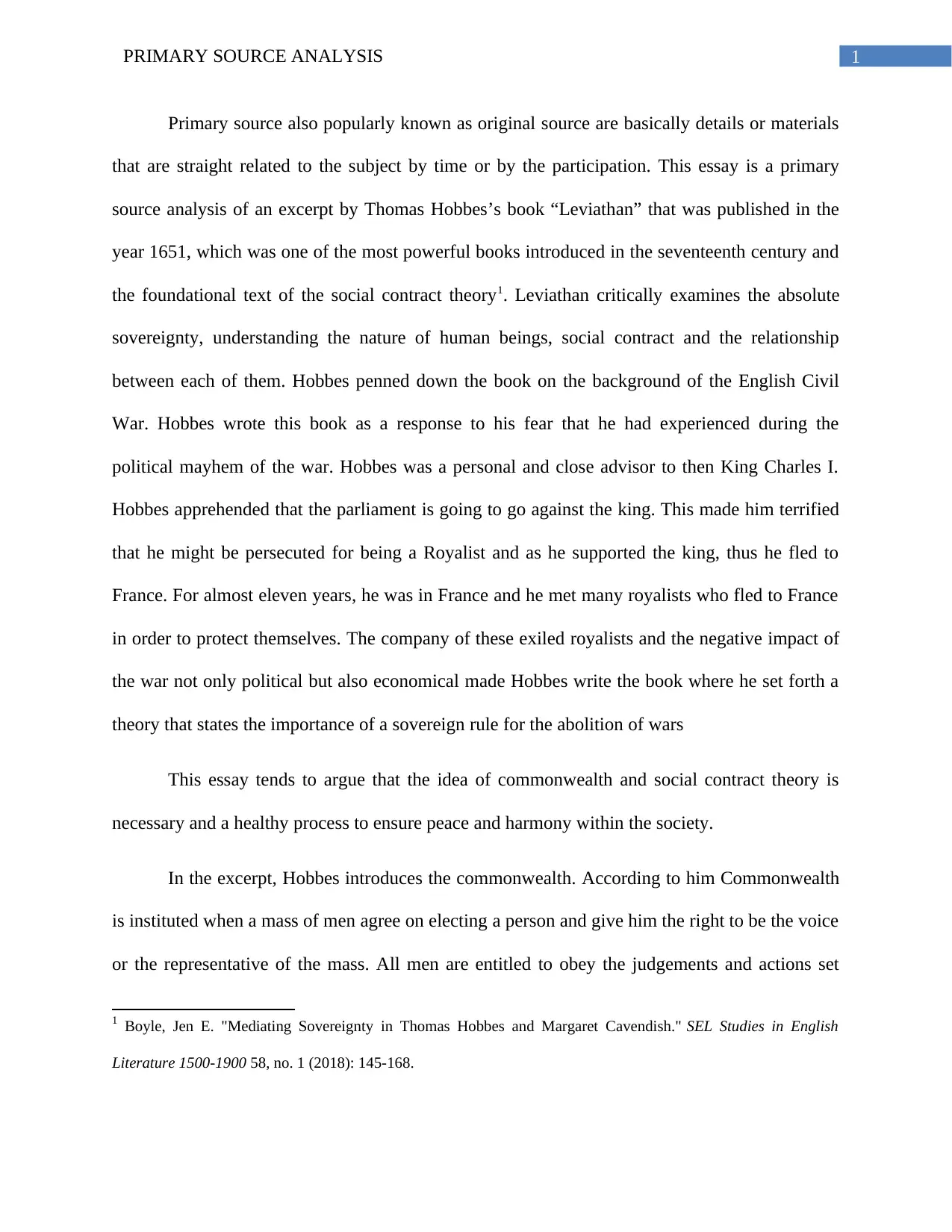
1PRIMARY SOURCE ANALYSIS
Primary source also popularly known as original source are basically details or materials
that are straight related to the subject by time or by the participation. This essay is a primary
source analysis of an excerpt by Thomas Hobbes’s book “Leviathan” that was published in the
year 1651, which was one of the most powerful books introduced in the seventeenth century and
the foundational text of the social contract theory1. Leviathan critically examines the absolute
sovereignty, understanding the nature of human beings, social contract and the relationship
between each of them. Hobbes penned down the book on the background of the English Civil
War. Hobbes wrote this book as a response to his fear that he had experienced during the
political mayhem of the war. Hobbes was a personal and close advisor to then King Charles I.
Hobbes apprehended that the parliament is going to go against the king. This made him terrified
that he might be persecuted for being a Royalist and as he supported the king, thus he fled to
France. For almost eleven years, he was in France and he met many royalists who fled to France
in order to protect themselves. The company of these exiled royalists and the negative impact of
the war not only political but also economical made Hobbes write the book where he set forth a
theory that states the importance of a sovereign rule for the abolition of wars
This essay tends to argue that the idea of commonwealth and social contract theory is
necessary and a healthy process to ensure peace and harmony within the society.
In the excerpt, Hobbes introduces the commonwealth. According to him Commonwealth
is instituted when a mass of men agree on electing a person and give him the right to be the voice
or the representative of the mass. All men are entitled to obey the judgements and actions set
1 Boyle, Jen E. "Mediating Sovereignty in Thomas Hobbes and Margaret Cavendish." SEL Studies in English
Literature 1500-1900 58, no. 1 (2018): 145-168.
Primary source also popularly known as original source are basically details or materials
that are straight related to the subject by time or by the participation. This essay is a primary
source analysis of an excerpt by Thomas Hobbes’s book “Leviathan” that was published in the
year 1651, which was one of the most powerful books introduced in the seventeenth century and
the foundational text of the social contract theory1. Leviathan critically examines the absolute
sovereignty, understanding the nature of human beings, social contract and the relationship
between each of them. Hobbes penned down the book on the background of the English Civil
War. Hobbes wrote this book as a response to his fear that he had experienced during the
political mayhem of the war. Hobbes was a personal and close advisor to then King Charles I.
Hobbes apprehended that the parliament is going to go against the king. This made him terrified
that he might be persecuted for being a Royalist and as he supported the king, thus he fled to
France. For almost eleven years, he was in France and he met many royalists who fled to France
in order to protect themselves. The company of these exiled royalists and the negative impact of
the war not only political but also economical made Hobbes write the book where he set forth a
theory that states the importance of a sovereign rule for the abolition of wars
This essay tends to argue that the idea of commonwealth and social contract theory is
necessary and a healthy process to ensure peace and harmony within the society.
In the excerpt, Hobbes introduces the commonwealth. According to him Commonwealth
is instituted when a mass of men agree on electing a person and give him the right to be the voice
or the representative of the mass. All men are entitled to obey the judgements and actions set
1 Boyle, Jen E. "Mediating Sovereignty in Thomas Hobbes and Margaret Cavendish." SEL Studies in English
Literature 1500-1900 58, no. 1 (2018): 145-168.
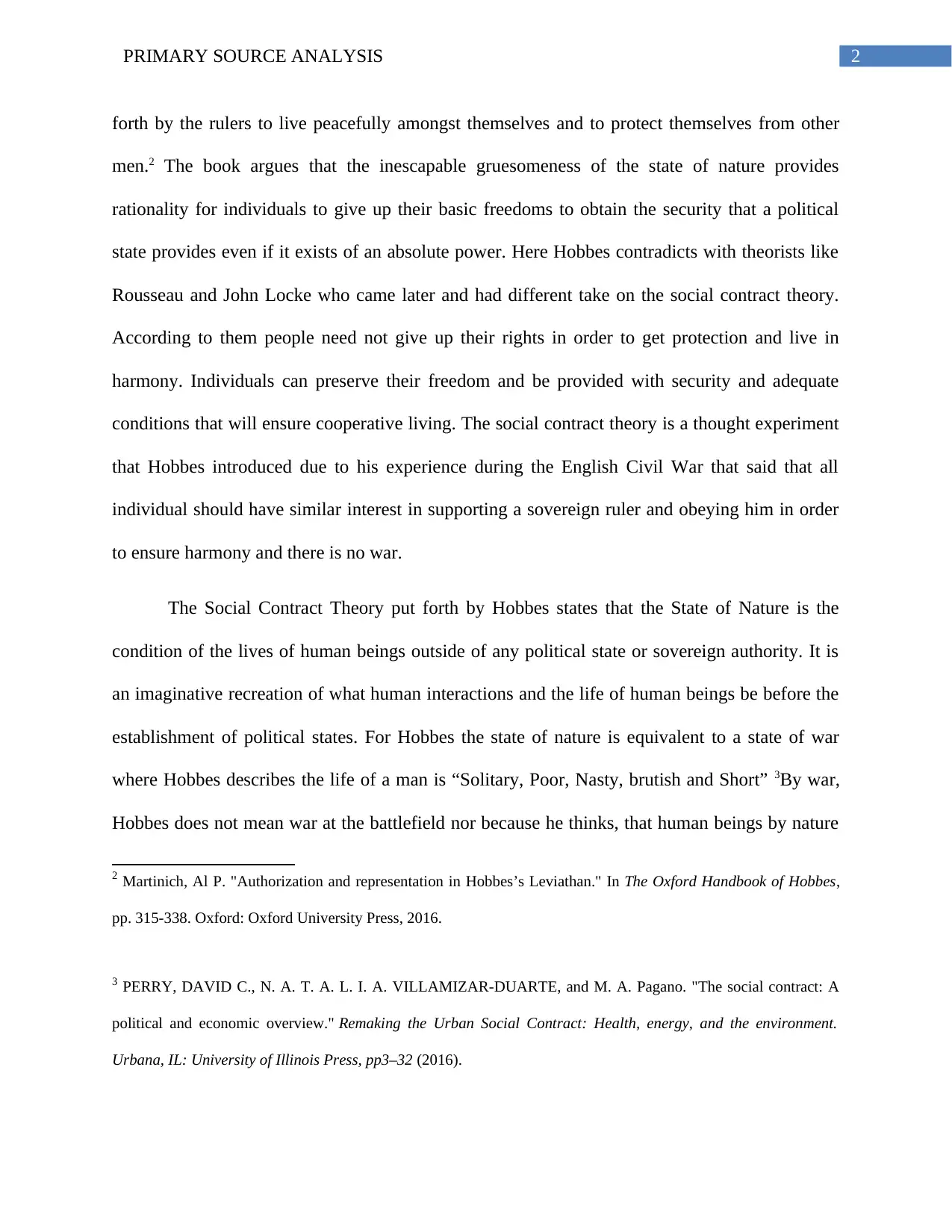
2PRIMARY SOURCE ANALYSIS
forth by the rulers to live peacefully amongst themselves and to protect themselves from other
men.2 The book argues that the inescapable gruesomeness of the state of nature provides
rationality for individuals to give up their basic freedoms to obtain the security that a political
state provides even if it exists of an absolute power. Here Hobbes contradicts with theorists like
Rousseau and John Locke who came later and had different take on the social contract theory.
According to them people need not give up their rights in order to get protection and live in
harmony. Individuals can preserve their freedom and be provided with security and adequate
conditions that will ensure cooperative living. The social contract theory is a thought experiment
that Hobbes introduced due to his experience during the English Civil War that said that all
individual should have similar interest in supporting a sovereign ruler and obeying him in order
to ensure harmony and there is no war.
The Social Contract Theory put forth by Hobbes states that the State of Nature is the
condition of the lives of human beings outside of any political state or sovereign authority. It is
an imaginative recreation of what human interactions and the life of human beings be before the
establishment of political states. For Hobbes the state of nature is equivalent to a state of war
where Hobbes describes the life of a man is “Solitary, Poor, Nasty, brutish and Short” 3By war,
Hobbes does not mean war at the battlefield nor because he thinks, that human beings by nature
2 Martinich, Al P. "Authorization and representation in Hobbes’s Leviathan." In The Oxford Handbook of Hobbes,
pp. 315-338. Oxford: Oxford University Press, 2016.
3 PERRY, DAVID C., N. A. T. A. L. I. A. VILLAMIZAR-DUARTE, and M. A. Pagano. "The social contract: A
political and economic overview." Remaking the Urban Social Contract: Health, energy, and the environment.
Urbana, IL: University of Illinois Press, pp3–32 (2016).
forth by the rulers to live peacefully amongst themselves and to protect themselves from other
men.2 The book argues that the inescapable gruesomeness of the state of nature provides
rationality for individuals to give up their basic freedoms to obtain the security that a political
state provides even if it exists of an absolute power. Here Hobbes contradicts with theorists like
Rousseau and John Locke who came later and had different take on the social contract theory.
According to them people need not give up their rights in order to get protection and live in
harmony. Individuals can preserve their freedom and be provided with security and adequate
conditions that will ensure cooperative living. The social contract theory is a thought experiment
that Hobbes introduced due to his experience during the English Civil War that said that all
individual should have similar interest in supporting a sovereign ruler and obeying him in order
to ensure harmony and there is no war.
The Social Contract Theory put forth by Hobbes states that the State of Nature is the
condition of the lives of human beings outside of any political state or sovereign authority. It is
an imaginative recreation of what human interactions and the life of human beings be before the
establishment of political states. For Hobbes the state of nature is equivalent to a state of war
where Hobbes describes the life of a man is “Solitary, Poor, Nasty, brutish and Short” 3By war,
Hobbes does not mean war at the battlefield nor because he thinks, that human beings by nature
2 Martinich, Al P. "Authorization and representation in Hobbes’s Leviathan." In The Oxford Handbook of Hobbes,
pp. 315-338. Oxford: Oxford University Press, 2016.
3 PERRY, DAVID C., N. A. T. A. L. I. A. VILLAMIZAR-DUARTE, and M. A. Pagano. "The social contract: A
political and economic overview." Remaking the Urban Social Contract: Health, energy, and the environment.
Urbana, IL: University of Illinois Press, pp3–32 (2016).
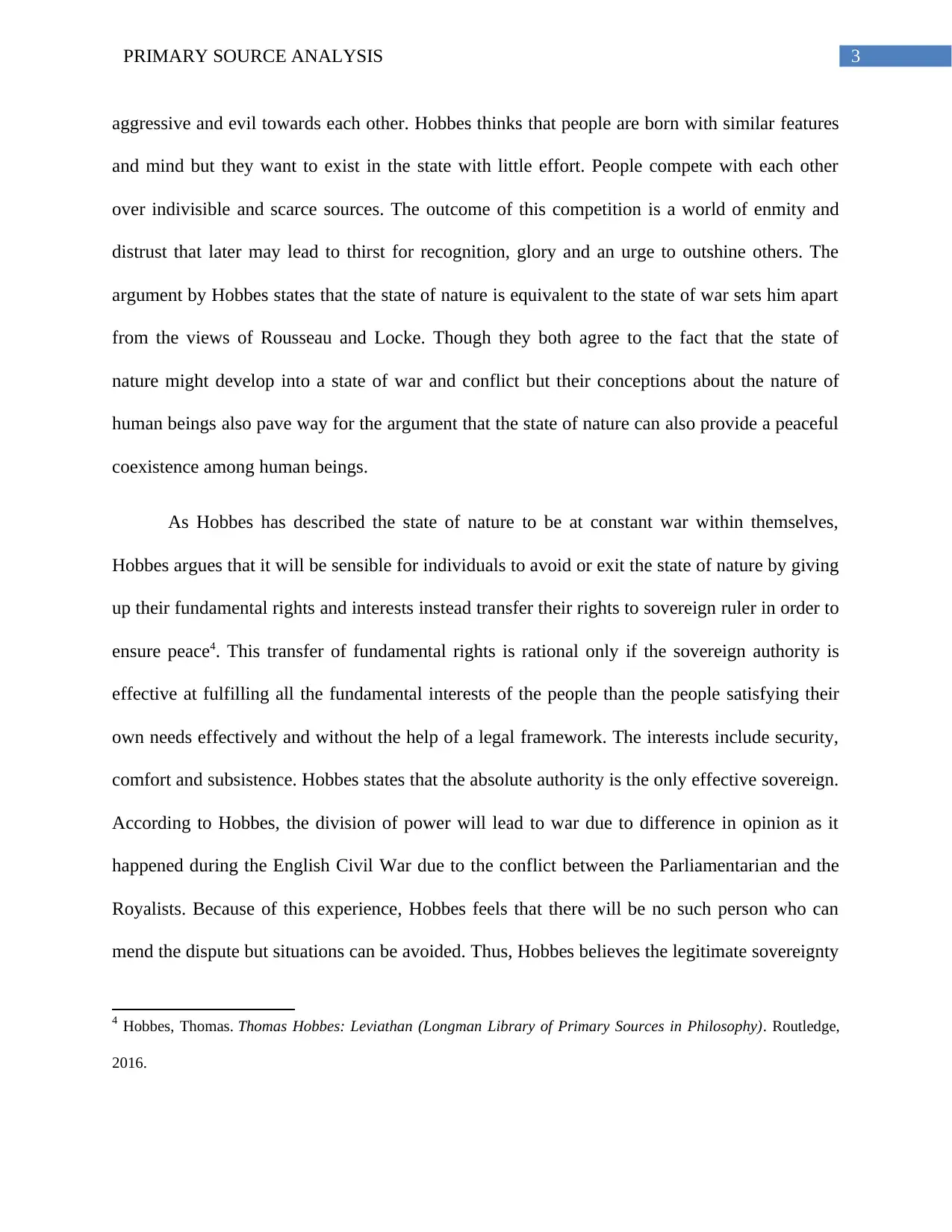
3PRIMARY SOURCE ANALYSIS
aggressive and evil towards each other. Hobbes thinks that people are born with similar features
and mind but they want to exist in the state with little effort. People compete with each other
over indivisible and scarce sources. The outcome of this competition is a world of enmity and
distrust that later may lead to thirst for recognition, glory and an urge to outshine others. The
argument by Hobbes states that the state of nature is equivalent to the state of war sets him apart
from the views of Rousseau and Locke. Though they both agree to the fact that the state of
nature might develop into a state of war and conflict but their conceptions about the nature of
human beings also pave way for the argument that the state of nature can also provide a peaceful
coexistence among human beings.
As Hobbes has described the state of nature to be at constant war within themselves,
Hobbes argues that it will be sensible for individuals to avoid or exit the state of nature by giving
up their fundamental rights and interests instead transfer their rights to sovereign ruler in order to
ensure peace4. This transfer of fundamental rights is rational only if the sovereign authority is
effective at fulfilling all the fundamental interests of the people than the people satisfying their
own needs effectively and without the help of a legal framework. The interests include security,
comfort and subsistence. Hobbes states that the absolute authority is the only effective sovereign.
According to Hobbes, the division of power will lead to war due to difference in opinion as it
happened during the English Civil War due to the conflict between the Parliamentarian and the
Royalists. Because of this experience, Hobbes feels that there will be no such person who can
mend the dispute but situations can be avoided. Thus, Hobbes believes the legitimate sovereignty
4 Hobbes, Thomas. Thomas Hobbes: Leviathan (Longman Library of Primary Sources in Philosophy). Routledge,
2016.
aggressive and evil towards each other. Hobbes thinks that people are born with similar features
and mind but they want to exist in the state with little effort. People compete with each other
over indivisible and scarce sources. The outcome of this competition is a world of enmity and
distrust that later may lead to thirst for recognition, glory and an urge to outshine others. The
argument by Hobbes states that the state of nature is equivalent to the state of war sets him apart
from the views of Rousseau and Locke. Though they both agree to the fact that the state of
nature might develop into a state of war and conflict but their conceptions about the nature of
human beings also pave way for the argument that the state of nature can also provide a peaceful
coexistence among human beings.
As Hobbes has described the state of nature to be at constant war within themselves,
Hobbes argues that it will be sensible for individuals to avoid or exit the state of nature by giving
up their fundamental rights and interests instead transfer their rights to sovereign ruler in order to
ensure peace4. This transfer of fundamental rights is rational only if the sovereign authority is
effective at fulfilling all the fundamental interests of the people than the people satisfying their
own needs effectively and without the help of a legal framework. The interests include security,
comfort and subsistence. Hobbes states that the absolute authority is the only effective sovereign.
According to Hobbes, the division of power will lead to war due to difference in opinion as it
happened during the English Civil War due to the conflict between the Parliamentarian and the
Royalists. Because of this experience, Hobbes feels that there will be no such person who can
mend the dispute but situations can be avoided. Thus, Hobbes believes the legitimate sovereignty
4 Hobbes, Thomas. Thomas Hobbes: Leviathan (Longman Library of Primary Sources in Philosophy). Routledge,
2016.
Paraphrase This Document
Need a fresh take? Get an instant paraphrase of this document with our AI Paraphraser
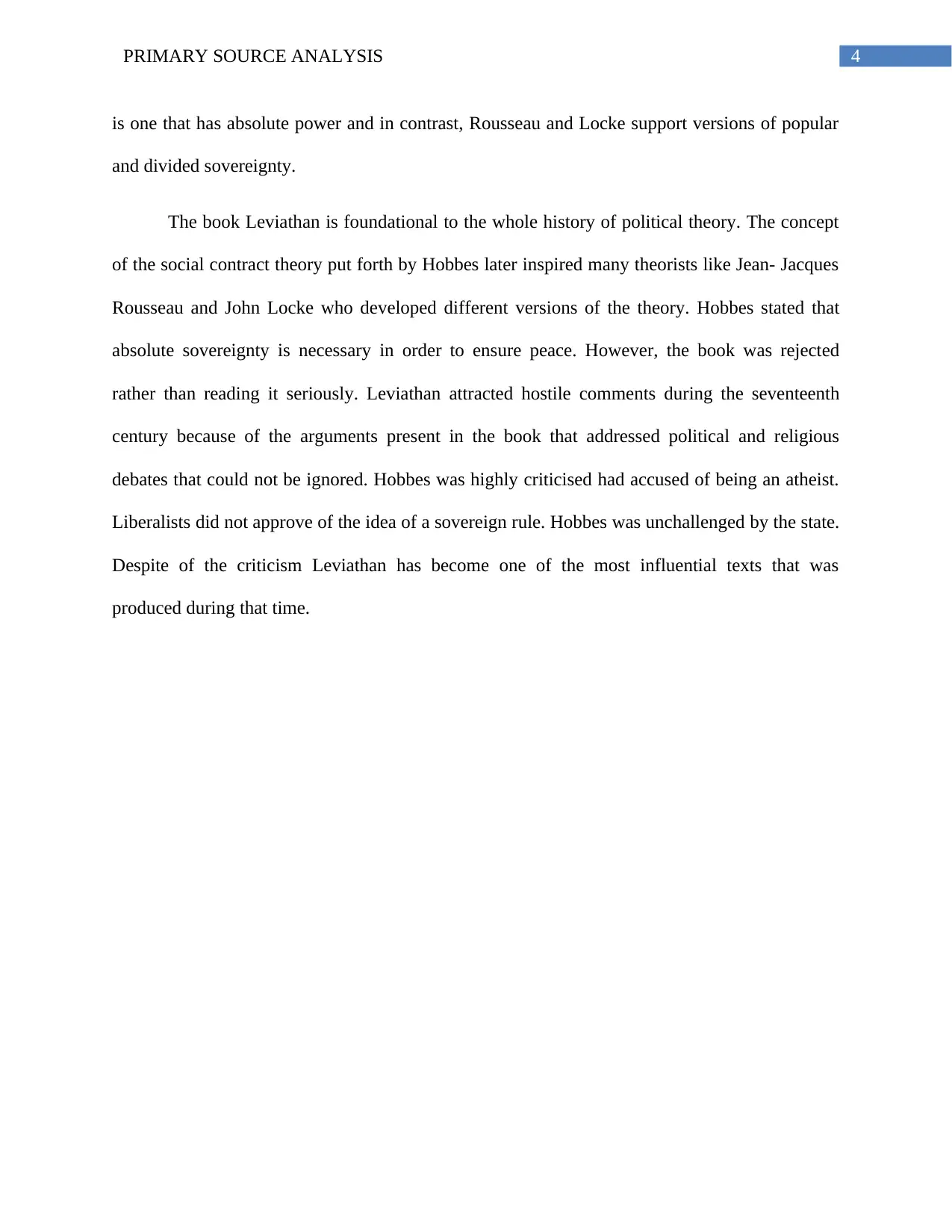
4PRIMARY SOURCE ANALYSIS
is one that has absolute power and in contrast, Rousseau and Locke support versions of popular
and divided sovereignty.
The book Leviathan is foundational to the whole history of political theory. The concept
of the social contract theory put forth by Hobbes later inspired many theorists like Jean- Jacques
Rousseau and John Locke who developed different versions of the theory. Hobbes stated that
absolute sovereignty is necessary in order to ensure peace. However, the book was rejected
rather than reading it seriously. Leviathan attracted hostile comments during the seventeenth
century because of the arguments present in the book that addressed political and religious
debates that could not be ignored. Hobbes was highly criticised had accused of being an atheist.
Liberalists did not approve of the idea of a sovereign rule. Hobbes was unchallenged by the state.
Despite of the criticism Leviathan has become one of the most influential texts that was
produced during that time.
is one that has absolute power and in contrast, Rousseau and Locke support versions of popular
and divided sovereignty.
The book Leviathan is foundational to the whole history of political theory. The concept
of the social contract theory put forth by Hobbes later inspired many theorists like Jean- Jacques
Rousseau and John Locke who developed different versions of the theory. Hobbes stated that
absolute sovereignty is necessary in order to ensure peace. However, the book was rejected
rather than reading it seriously. Leviathan attracted hostile comments during the seventeenth
century because of the arguments present in the book that addressed political and religious
debates that could not be ignored. Hobbes was highly criticised had accused of being an atheist.
Liberalists did not approve of the idea of a sovereign rule. Hobbes was unchallenged by the state.
Despite of the criticism Leviathan has become one of the most influential texts that was
produced during that time.
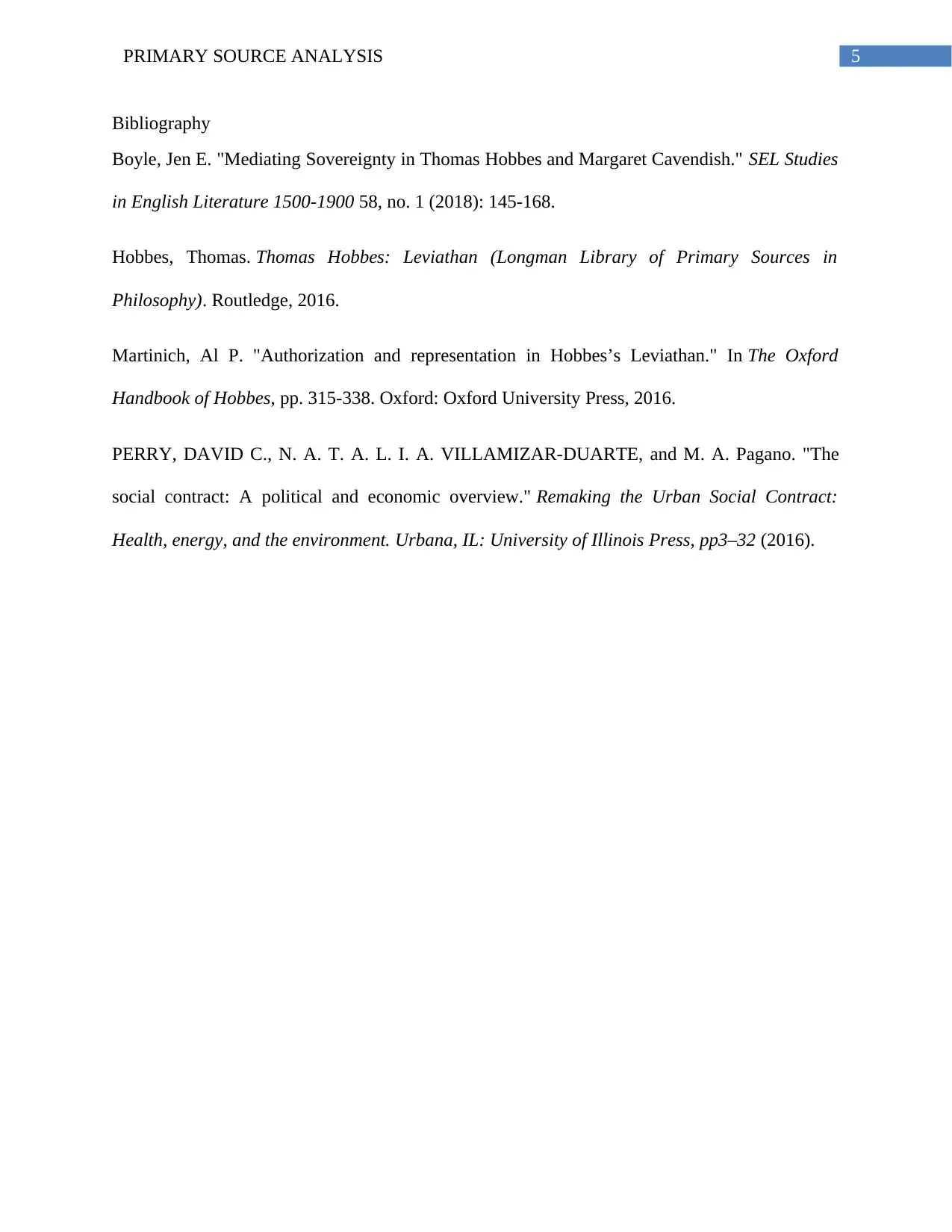
5PRIMARY SOURCE ANALYSIS
Bibliography
Boyle, Jen E. "Mediating Sovereignty in Thomas Hobbes and Margaret Cavendish." SEL Studies
in English Literature 1500-1900 58, no. 1 (2018): 145-168.
Hobbes, Thomas. Thomas Hobbes: Leviathan (Longman Library of Primary Sources in
Philosophy). Routledge, 2016.
Martinich, Al P. "Authorization and representation in Hobbes’s Leviathan." In The Oxford
Handbook of Hobbes, pp. 315-338. Oxford: Oxford University Press, 2016.
PERRY, DAVID C., N. A. T. A. L. I. A. VILLAMIZAR-DUARTE, and M. A. Pagano. "The
social contract: A political and economic overview." Remaking the Urban Social Contract:
Health, energy, and the environment. Urbana, IL: University of Illinois Press, pp3–32 (2016).
Bibliography
Boyle, Jen E. "Mediating Sovereignty in Thomas Hobbes and Margaret Cavendish." SEL Studies
in English Literature 1500-1900 58, no. 1 (2018): 145-168.
Hobbes, Thomas. Thomas Hobbes: Leviathan (Longman Library of Primary Sources in
Philosophy). Routledge, 2016.
Martinich, Al P. "Authorization and representation in Hobbes’s Leviathan." In The Oxford
Handbook of Hobbes, pp. 315-338. Oxford: Oxford University Press, 2016.
PERRY, DAVID C., N. A. T. A. L. I. A. VILLAMIZAR-DUARTE, and M. A. Pagano. "The
social contract: A political and economic overview." Remaking the Urban Social Contract:
Health, energy, and the environment. Urbana, IL: University of Illinois Press, pp3–32 (2016).
1 out of 6
Your All-in-One AI-Powered Toolkit for Academic Success.
+13062052269
info@desklib.com
Available 24*7 on WhatsApp / Email
![[object Object]](/_next/static/media/star-bottom.7253800d.svg)
Unlock your academic potential
© 2024 | Zucol Services PVT LTD | All rights reserved.


